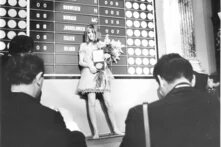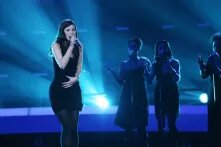For one evening, a global audience watches a show staged with the most elaborate means at the height of technical feasibility. What makes the ESC one of the most fascinating media events of our time?

The Eurovision Song Contest (ESC) is undoubtedly one of the most fascinating media events of our time. Every year, hundreds of millions around the world watch it on their tv sets, computer screens, smartphones, or at one of the many public viewings held by pubs, fan clubs, or other private organisations. For one evening, viewers enjoy an elaborately staged, state-of-the art show that pushes event technology to its very limits. For one evening, the political mechanisms of the Western world are reduced to who gives whom 12 points. For one evening, people peacefully celebrate cultural diversity and tolerance, exactly as the inventors of the contest intended ...
Uniting nations as a founding myth
Beyond the ESC’s founding myth of uniting nations, which the European Broadcasting Union (EBU) has carried like a banner for almost 20 years, the world’s largest music competition is, and always has been, primarily a platform for international television cooperation. That’s what it was back in 1956 when it first flickered into the living rooms of the select few who were lucky enough to own a television set. At that time, just 4 percent of the German population had access to a television set, which often entailed visiting wealthier relatives or neighbours, or sometimes just standing in front of a tv shop window for hours.
Sanremo as a model
Big televised events, such as the 1953 coronation of Queen Elizabeth II, had proven to be ideal vehicles to make the young medium of television appeal to the general public and boost sales of television sets, which were still a rather expensive investment at the time. In 1955, the EBU tasked a work group with the creation of a regular major event. The idea of a music contest came up, modelled after the Sanremo Festival in Italy, which had been launched in 1951.
The music contest was intended to make the young medium of television appeal to the general public.
Other options, such as a circus competition or an artists’ contest between different cities were quickly discarded, possibly because a televised music contest also lent itself to the medium of radio. In fact, far more people listened to the first Eurovision Song Contest on May 24, 1956, on their home radio rather than watching it on television.
A music contest of little relevance to the music industry
This was to change in the following years as television as an entertainment medium made its triumphal entry into European living rooms. Ten years after the first ESC, more than two thirds of all German households owned a television set. By that point, a win at the ESC usually also spelt international commercial success. However, although the express purpose of the ESC as per its regulations was to “encourage the output of original songs in the participants’ countries by bringing about rivalry between authors and composers through the international comparison of their works” it never bore great relevance for the music industry because due to language and cultural barriers, national music markets continued to operate in relative isolation from each other.
“A window to the world”
Once television had become an integral part of European living rooms, the Eurovision Song Contest persistently claimed a special place in the viewers’ hearts. The very sound of the Eurovision anthem promised a unique program beyond the usual television routine. As Europe began to integrate from the mid-1960s, European-themed programs such as “Spiel ohne Grenzen” (Game Without Borders) or the quiz show “Einer wird gewinnen” (One Will Win) were very popular in German-speaking countries, stirring the public’s curiosity about other, perhaps unknown parts of Europe. The Eurovision Song Contest also opened a “window to the world”.
Ritualised reception
However, the ESC also differs from routine programming because of its broadcasting time. A compromise between the various participating stations, it is broadcast out of synch with the usual programme schedules in many countries to this day. The contest starts later than regular television prime time almost everywhere in Europe, which has made the show run closer and closer to midnight as the number of participating countries grew. This makes the viewing experience feel a little like New Year’s Eve, and it is anticipated with similar excitement, especially by children who are allowed to stay up to watch the broadcast. It has made the ESC a special event in the calendar, akin to a holiday for many viewers. No other programme has been able to reliably maintain a similar status over the years.
Strict standardization
The program creators did their part to turn the annual event into a television ritual. Even in the early years of the contest, at the suggestion of the BBC, the countries rather than songs received the scores, which emphasised the competitive nature of the event. The contest procedure was strictly standardised and remained almost unchanged over the years. In the 1970s, two more key elements, which are still in place today, were added to further the show’s ritualised reception: Short vignettes about the contestants were first shown in 1970, and the 12-point scoring system was introduced in 1975.
A necessary evil
In 2004, to further emphasize the ritual character of the show, certain elements that had established themselves over the years (“Could I have your votes, please?”) were specifically expanded to include additional catch phrases such as “Let the Eurovision Song Contest begin” and “Europe, start voting now!” By then, the EBU had come to understand that the format it had built over a span of almost 50 years needed to be preserved. Previously, there had been repeated calls to cancel the spectacle due to dwindling ratings. In 1995, then Executive Supervisor of the ESC Christian Claussen declared: “The ESC is for EBU and most of the persons in charge of it a kind of necessary evil. Nobody really knows where to put it. They would like to suppress it, but they can’t.”
Synonymous with Eurovision
In fact, over the years, the Eurovision Song Contest had become so synonymous with the work of Eurovision – the EBU’s television program exchange – that executives seemed to fear that without the contest, the very term “Eurovision” would vanish from public perception. So since they couldn’t get rid of the programme, it had to be adapted to the requirements of a new millennium. Jürgen Meier-Beer, then head of entertainment at NDR, made this push after taking charge of the national pre-selection and Germany’s participation in the international ESC. He soon rallied like-minded programme managers in other countries and radically overhauled the contest.
The ESC has always been less about music and more about television.
“World-class live television production”
The ESC not only introduced audience voting and dropped the live orchestra and the requirement for performers to sing in their national language, but also finally shed its fig leaf of music promotion in 2004, striking the relevant passage from the regulations. Since then, the contest has no longer had an official objective beyond its self-proclaimed identity as a “state-of-the-art, prime-time entertainment programme, world-class live television production,” which actually brings it a little closer to its original purpose. The ESC has always been less about music and more about television, and even if some aesthetically minded programming executives would rather send more sophisticated songs to the ESC, the event has never been about high-brow culture.
A flagship for technological mastery
On of the show’s purposes was to demonstrate the supremacy of public television and the power of its international cooperation network (especially since the advent of private television). Given that Eurovision is in charge of news exchange and has to compete with private providers for broadcasting rights (e.g. international sporting events), the ESC still is an important showcase for the EBU’s technological capabilities. Secondly, in many countries, the ESC underlines the special position of public broadcasting by conveying key principles of public media, such as universality, diversity, innovation, but also promoting a sense of community and national identity.
Show technology fuelled by eastward expansion
Since the fall of the Iron Curtain, community spirit and national identity have become even more central to the ESC than was already engrained in its very concept as an international competition. Not only did the successor states of Yugoslavia claim their place in the Eurovision family, but the former Warsaw Pact states and the successor states of the defunct Soviet Union also knocked on the door of the EBU, which was only too happy to expand its base. These new participant countries brought a new ambition to the contest that invigorated the ESC both musically and in terms of showmanship. At the same time, participants began to emphasise their cultural and national differences to make an impression on the European stage. The expectations of what makes a “good” ESC entry now also included national symbolism.
Opening up to a wide audience
Until the late 1980s, the display of national symbols in the audience was frowned upon. The invited guests would never have compromised their fancy tuxedos and evening dresses with gawdy flags. It was not until 1991 that the audience began to shyly wave the first flags. The audience consisted of national delegation members who had no task to perform on stage or backstage. By opening up the event to a wider audience, initially by raffling tickets through the Irish National Lottery, and later via regular box office sales at the venue, more fans gained access to the event. For years, they had faithfully followed the competition on the screen. Now they wanted to experience the action up close and personal.
Flag-waving fans
The fans had come to feel a twofold sense of community: with their own country, whose artist they had come to cheer, but also to the many millions of others around the world who were also watching the ESC. The ESC made people feel like a part of a community that is watching television history unfold before their eyes. Making the contest accessible to a broader audience not only opened up new sources of income for the hosting broadcaster, but the image of enthusiastically cheering fans also provided a striking backdrop to the action on stage. Today, it is hard to imagine the ESC without colourfully clad, flag-waving fans.
The ESC as a legend
The ESC owes its fans far more than appealing background footage. With its love for the contest, the community that emerged in the 1980s was a major factor in giving the contest the worldwide attention it enjoys today. Fanzines kept the memory of ESC history alive when mass media showed barely any interest. At their meetings, fan clubs honoured the memory of long-forgotten artists. And lastly, many ESC fans aspired to and attained media positions as press, radio, and television editors, enabling them to actively shape the contest and its public perception. As multipliers in the media and in social media around the world, they have carried, and continue to carry, the torch of the ESC.
The ESC is a living tradition, a bit like Easter.
A format goes around the world?
Encouraged by the success of the rebranded Eurovision Song Contest after 2004, executives soon began to harbour even greater ambitions. In 2007, a World Eurovision Song Contest was announced, with offshoots of the ESC on all continents. Concrete announcements were made for contests in Asia and Africa, which failed to materialise in the aspired form. Two other planned spin-offs, Eurovision Canada and Eurovision Latin America, have been on hold for two years. Only the “American Song Contest,” featuring songs from the 50 US states, was held for the first time in 2022. It is uncertain whether it will be continued. But why is the EBU unable to establish its successful format in other parts of the world?
Living tradition
Maybe it’s because the ESC isn’t really a format after all. It was born out of the need to create a platform for regular television collaboration. It endured because the executives needed it as a flagship. And it grew because the post-Wall era revived it with new impulses. Above all, however, it is a living tradition, a bit like Easter: Easter is neither just a pagan fertility rite nor a mere Christian celebration of redemption; the holiday is not only about the Easter Bunny or egg hunting – it’s all of its elements in combination. In the same way, the ESC tradition draws on a variety of different, sometimes contradictory sources: childhood memories of family evenings in front of the television while snacking on edible arrangements, a cultural community that has evolved over centuries, but also the contrasts between the participating countries, an escape from daily drudgery, and the thrill of watching an event simultaneously with and alongside millions of other people. None of this can be reduced to one format, because it goes far beyond what a televised format can do. But it does make the Eurovision Song Contest what it is to this day: a phenomenon.
Dr Irving Benoît Wolther (“Dr Eurovision”) is a linguist and cultural scientist, journalist, and author. Among other things, he works for the official German Eurovision Song Contest website eurovision.de. He regularly gives academic lectures on the ESC, including as a guest speaker at the Information Center of the German Embassy in Paris in cooperation with the Institut d'Etudes Politiques de Paris (Sciences Po) in 2011 and as a keynote speaker at the "Dare to Dream of Europe" conference of the Federal Agency for Civic Education (Bundeszentrale für politische Bildung) in Berlin in 2019.
Translation: Kerstin Trimble


